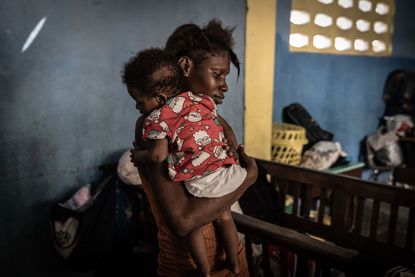Kenyan police could make Haiti's problems worse
Haiti has a history of disastrous foreign interventions. Kenyan police are accused of brutality. Now the two will mix.


A free daily digest of the biggest news stories of the day - and the best features from our website
Thank you for signing up to TheWeek. You will receive a verification email shortly.
There was a problem. Please refresh the page and try again.
Haiti has a long history of violence and chaos. It also has a long history of outsiders coming in ostensibly to bring order, but instead creating even more problems for the country's people. Will that history continue? CNN reported this week that the United Nations has given approval for Kenyan police to lead a multinational force to help get Haiti's gang violence under control. But critics say the Kenyan police force has a pattern of brutality that includes "extrajudicial killings and arbitrary execution of protestors."
There's no doubt that Haiti is in dire need of help. "Gangs have terrorized civilians" for two years, committing thousands of murders since the assassination of President Jovenel Moïse in 2021, Ellen Ioanes of Vox pointed out. Haitian police are "outgunned and underpaid," so many observers believe "an external force of some kind" is necessary. But previous interventions by outsiders are remembered mostly for their exploitation of the country — along with more killings, a cholera epidemic and widespread sexual abuse. All of which raises a question: "Will this be different from previous international interventions?"
Kenya does have a history of peacekeeping operations, Al Jazeera reported. And the African country stands to gain prestige if the Haiti mission is successful. "On the global stage, sending its forces to Haiti gives Kenya ... very serious political capital," said one analyst. Those gains could be undercut, though, if this intervention ends up as yet another disaster.
Subscribe to The Week
Escape your echo chamber. Get the facts behind the news, plus analysis from multiple perspectives.

Sign up for The Week's Free Newsletters
From our morning news briefing to a weekly Good News Newsletter, get the best of The Week delivered directly to your inbox.
From our morning news briefing to a weekly Good News Newsletter, get the best of The Week delivered directly to your inbox.
'Kenyan police are rogue'
Human rights groups say that "Kenyan police officers have shot and beaten hundreds of protesters this year," The New York Times reported. That raises concerns that the ostensible peacekeepers "will put civilians in harm's way" as they combat Haiti's gangs. Kenya was chosen for the mission to avoid "what might look like a Western occupation of a developing country." And Kenya's leaders say the country's peacekeeping missions have an "impeccable" record. That's questionable. Said one victim of the alleged brutality: "Kenyan police are rogue."
"Haiti has been treated as a ward of major powers … for decades," Daniel Larison argued at Responsible Statecraft. The Kenya-led intervention has "even less support and fewer resources than previous efforts," which makes it "foolish" to think that it can end up with a better outcome. A Haitian-led solution is needed, not another intrusion by outsiders. "No matter how well-intentioned the Kenyan-led mission may be, it is a mistake."
"As strange and unsavory as a Kenyan-led multinational force sounds, it's a solution that deserves a chance," The Boston Globe editorialized. The U.S. can't play a direct role — the American "history of ill-fated interventions in Haiti" means it has to step back and be supportive of other efforts. Backing Kenya's mission "may represent the most realistic way" for the U.S. to help Haiti. It's necessary to try. "Unfortunately, as bad and unprecedented as things are in Haiti right now, they can always get worse."
No U.S. troops
The U.S. is backing Kenya's mission, The Miami Herald reported. The State Department and Department of Defense have pledged $100 million each to the effort, though the particulars of how that money will be used is "not immediately clear." One thing that is clear: The U.S. won't be sending any of its own troops to Haiti. "The U.S. military will provide some enabling support," a White House spokesman said.
Meanwhile, the Kenyan police deployment isn't fully supported within Kenya. The Associated Press reported that opposition lawmakers are insisting that parliament approve the mission to Haiti. Assuming the deployment goes forward, though, Kenyan forces face a difficult task under the best of circumstances: "neutralize the armed gangs, protect civilians, and bring about peace, security and order," BBC pointed out. Haiti's history, a past filled with disastrous interventions, and the questions regarding Kenyan police only add to the challenge. The outsiders "will need to be careful to avoid innocent civilian casualties," BBC noted, "and also to win the 'hearts and minds' battle too."

Continue reading for free
We hope you're enjoying The Week's refreshingly open-minded journalism.
Subscribed to The Week? Register your account with the same email as your subscription.
Sign up to our 10 Things You Need to Know Today newsletter
A free daily digest of the biggest news stories of the day - and the best features from our website
Joel Mathis is a freelance writer who lives in Lawrence, Kansas with his wife and son. He spent nine years as a syndicated columnist, co-writing the RedBlueAmerica column as the liberal half of a point-counterpoint duo. His honors include awards for best online commentary from the Online News Association and (twice) from the City and Regional Magazine Association.
-
 Today's political cartoons - October 8, 2023
Today's political cartoons - October 8, 2023Cartoons Sunday's cartoons - building walls, flying planes, and more
By The Week Staff Published
-
 Why Apple's carbon-neutral claims may be misleading
Why Apple's carbon-neutral claims may be misleadingSpeed Read The company isn't disclosing all the information, a new report alleges
By Devika Rao Published
-
 5 unlawfully funny cartoons about the Trump fraud trial
5 unlawfully funny cartoons about the Trump fraud trialCartoons Artists take on gag orders, fast food recess, and more
By The Week Staff Published
-
 Laurence Fox: cancelled by GB News?
Laurence Fox: cancelled by GB News?Talking Point Demise of controversial commentator hasn't deflected criticism of the broadcaster
By The Week Staff Published
-
 High interest rates are changing everything you know about the economy and governing
High interest rates are changing everything you know about the economy and governingTalking Point In Washington, deficits suddenly matter again
By Joel Mathis Published
-
 Will Matt Gaetz's push to oust Kevin McCarthy backfire on him?
Will Matt Gaetz's push to oust Kevin McCarthy backfire on him?Talking Point Some Republicans are calling for the Florida Republican to be expelled from the House
By Justin Klawans Published
-
 Making plans for Nigel: could Farage return to the Tories?
Making plans for Nigel: could Farage return to the Tories?Talking Point Brexiteer has been linked with party leadership after creating a 'buzz' at conference
By Chas Newkey-Burden, The Week UK Published
-
 Debating the 'book ban-demic'
Debating the 'book ban-demic'Talking Point Banned Books Week comes at tender time for libraries. Conservatives are skeptical.
By Joel Mathis Published
-
 UN Security Council approves Haiti security mission led by Kenya
UN Security Council approves Haiti security mission led by KenyaSpeed Read Kenya has pledged 1,000 security personnel to help stabilize Haiti, but lots of questions remain
By Peter Weber Published
-
 Texas and Yelp are suing each other over crisis pregnancy centers
Texas and Yelp are suing each other over crisis pregnancy centersTalking Point A battle over free speech and abortion rights heads to court
By Joel Mathis Published
-
 Will the cannabis banking bill get the Senate's green light?
Will the cannabis banking bill get the Senate's green light?Talking Point The SAFER Banking Act is advancing to the US Senate for the first time, clearing a major hurdle for legal cannabis businesses. Does it stand a chance?
By Theara Coleman Published










